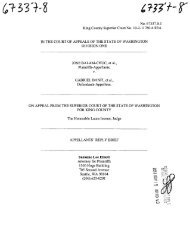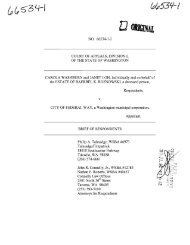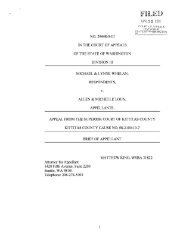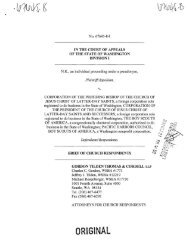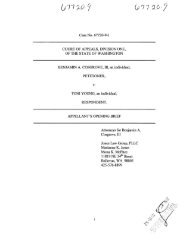Washington State Courts
Washington State Courts
Washington State Courts
You also want an ePaper? Increase the reach of your titles
YUMPU automatically turns print PDFs into web optimized ePapers that Google loves.
1. Johnson exceeded the limited scope of an<br />
investigative detention.<br />
The Fourth Amendment and article I, section 7 of the <strong>Washington</strong><br />
Constitution prohibit unreasonable searches and seizures. <strong>State</strong> v. Day,<br />
161 Wn.2d 889, 893, 168 P.3d 1265 (2007). Warrantless searches and<br />
seizures are generally per se unreasonable and the <strong>State</strong> bears the burden<br />
of demonstrating the applicability of a recognized exception to this rule.<br />
Id. at 893-94. "Exceptions to the warrant requirement are limited and<br />
narrowly drawn." <strong>State</strong> v. Parker, 139 Wn.2d 486, 496, 987 P.2d 73<br />
(1999).<br />
One recognized exception to the warrant requirement is the<br />
investigative detention. <strong>State</strong> v. Garvin, 166 Wn.2d 242, 249, 207 P.3d<br />
1266 (2009). An investigative detention is justified if the officer<br />
reasonably suspects the person is committing or is about to commit a<br />
crime. Id., at 250.<br />
In B.-H.'s case, the only source for suspicion was Officer Walker,<br />
who said he saw "[a] heavy hard object" that was "about six inches long"<br />
on the bottom of B.-H.'s coat pocket. RP 18, 26. Neither Schwab nor<br />
Johnson developed any independent suspicion.<br />
This scenario implicates the "fellow officer rule." An investigative<br />
detention under the "fellow officer rule" is justified only if the officer<br />
-10-



